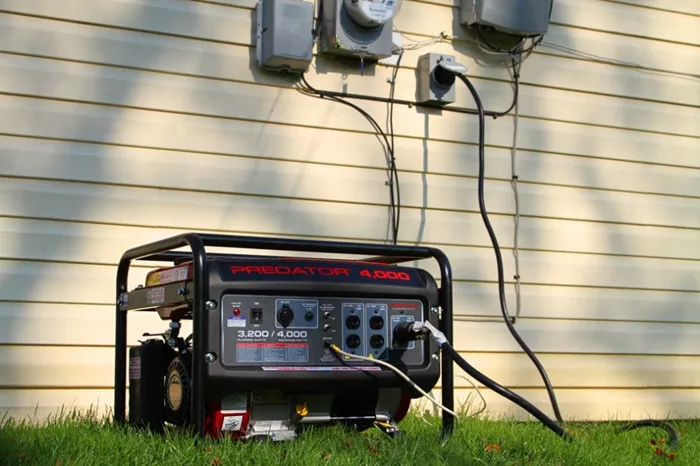Power outages can happen anytime, leaving your home in the dark. Whether it’s due to a storm, grid failure, or maintenance, having a reliable home generator ensures your family stays safe and comfortable. In this guide, we’ll explore the 5 top home generators available today, their features, and how to choose the right one for your needs.
Why You Need a Home Generator
Home generators provide peace of mind during power outages. They keep your lights on, your fridge running, and your devices charged. For homes in areas prone to extreme weather, a generator is not just a luxury—it’s a necessity.
Types of Home Generators
There are three main types of home generators, Each type has its own advantages and is suited for different needs.
1. Portable Generators
Portable generators are the most affordable and versatile option. They are easy to move and can power essential appliances during an outage.
Pros:
Affordable: Lower upfront cost compared to other types.
Versatile: Can be used for camping, tailgating, and home backup.
Easy to Store: Compact and lightweight.
Cons:
Limited Power Output: May not power your entire home.
Manual Operation: Requires setup and fueling during an outage.
Noise Levels: Can be loud compared to other types.
Top Portable Generators:
Honda EU2200i: Known for its reliability and quiet operation.
Champion 3800-Watt Dual Fuel: Offers flexibility with gas or propane.
Westinghouse WGen7500: High power output for larger homes.
2. Standby Generators
Standby generators are permanently installed and automatically turn on during a power outage. They are ideal for whole-home backup power.
Pros:
Automatic Operation: Starts automatically when the power goes out.
High Power Output: Can power your entire home, including HVAC systems.
Quiet Operation: Typically quieter than portable generators.
Cons:
Expensive: Higher upfront and installation costs.
Professional Installation Required: Needs a licensed electrician.
Space Requirements: Requires a dedicated outdoor space.
Top Standby Generators:
Generac 22kW Guardian Series: A popular choice for whole-home power.
Kohler 20kW RESIDENTIAL: Known for durability and performance.
Briggs & Stratton 12kW Home Standby: Great for mid-sized homes.
3. Inverter Generators
Inverter generators are a quieter, more efficient option for powering sensitive electronics. They are portable and ideal for smaller homes or recreational use.
Pros:
Quiet Operation: Much quieter than traditional generators.
Fuel Efficient: Uses less fuel due to adjustable engine speed.
Clean Power: Safe for sensitive electronics like laptops and phones.
Cons:
Lower Power Output: Not suitable for whole-home backup.
Higher Cost: More expensive than traditional portable generators.
Top Inverter Generators:
Yamaha EF2000iSv2: Compact and ultra-quiet.
Predator 3500 Super Quiet Inverter: Great value for the price.
WEN 56200i: Lightweight and affordable.
Key Features to Consider When Buying a Home Generator
1. Power Output
Determine how much power you need. Make a list of essential appliances and calculate their total wattage. Choose a generator that can handle at least 20% more than your calculated load.
2. Fuel Type
Generators run on different fuels: gas, propane, diesel, or dual fuel. Consider fuel availability and storage when making your choice.
3. Run Time
Look for a generator with a long run time. This ensures it can power your home for extended periods without frequent refueling.
4. Noise Level
Check the decibel (dB) rating. If noise is a concern, opt for an inverter or standby generator.
5. Portability
If you need mobility, choose a portable generator with wheels and handles. Standby generators are not portable but offer more power.
6. Transfer Switch
A transfer switch is essential for safely connecting your generator to your home’s electrical system. It prevents backfeeding, which can be dangerous.
Top Home Generators for 2025
1. Best Overall: Generac 22kW Guardian Series
Why It’s Great:
- Powers an entire home automatically.
- Reliable and durable.
- Comes with a 5-year warranty.
2. Best Portable: Honda EU2200i
Why It’s Great:
- Ultra-quiet operation.
- Lightweight and easy to transport.
- Excellent fuel efficiency.
3. Best Budget: Champion 3800-Watt Dual Fuel
Why It’s Great:
- Affordable and versatile.
- Runs on gas or propane.
- Includes a convenient electric start.
4. Best for Sensitive Electronics: Yamaha EF2000iSv2
Why It’s Great:
- Provides clean, stable power.
- Extremely quiet.
- Compact and portable.
5. Best for Large Homes: Kohler 20kW RESIDENTIAL
Why It’s Great:
- High power output for large homes.
- Durable and reliable.
- Automatic operation.
How to Maintain Your Home Generator
1. Regular Inspections
Check for leaks, corrosion, and wear. Inspect the oil, air filter, and spark plugs regularly.
2. Run the Generator Monthly
Run your generator for 10-15 minutes each month to keep it in good working condition.
3. Change the Oil
Follow the manufacturer’s guidelines for oil changes. This ensures the engine runs smoothly.
4. Store Fuel Properly
Use fresh fuel and add a stabilizer if storing for long periods. Drain the fuel tank if the generator won’t be used for several months.
5. Schedule Professional Maintenance
Have a professional inspect and service your generator annually. This helps identify and fix potential issues early.
Conclusion
A home generator is a smart investment for any household. Whether you choose a portable, standby, or inverter generator, having a reliable backup power source ensures your family’s safety and comfort during outages. Consider your power needs, budget, and preferences when selecting the best generator for your home. With proper maintenance, your generator will provide years of dependable service.
Related topic:
- 5 Top Affordable Home Generators
- 3 Best Generators for Off-Grid Homes
- 5 Best Home Emergency Power Generators

